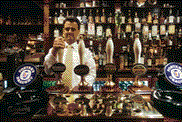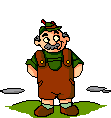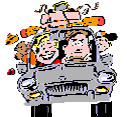Transplant Tips
Tips To Avoid Infections!
After undergoing a transplant it is important at all costs to try and avoid the risk of infections as the immune system is weakened due to the anti-rejection drugs.
Here are a few tips you should follow:
1. Wear a surgical mask when visiting hospitals.
2. Avoid contact with children who have received live vaccines for the first four weeks prior to injection.
3. Avoid Birds, and cleaning their cages - the dust mites can cause infection. Also avoid cat litter trays, don't clean the litter tray, do not clean fish tanks, or stroke stray animals.
4. When preparing fresh fruit and veg, clean thoroughly.
5. Wash your hands frequently and avoid contact with face and mouth. (See washing procedure)
(Tip 5... Washing hands, the correct procedure)
|
1. Adjust water to a comfortable level and wet hands. Dispense a small amount of soap into the palms of the hands creating a lather. 2. Using as much friction as needed, thoroughly clean all surfaces of hands including between the fingers. 3. Pay attention to the nails and nail beds by rubbing the nails of one hand across the palm of the other, creating enough friction to clean underneath the nails. 4. Rinse the hands under running water, being sure to hold the hands in a downward position. 5. Use paper towels or warm air blower to thoroughly dry the hands. 6. Using the same paper towel, turn off the water supply. |
||||||||||||||||||||||||||||||
|
|
||||||||||||||||||||||||||||||
|
When to Wash Your Hands |
||||||||||||||||||||||||||||||
|
||||||||||||||||||||||||||||||
6. Avoid persons with colds and Flu symptoms, if your friends are unwell ask them to visit only when over the worst.
7. Avoid all live vaccines such as:
Oral Polio vaccine (OPV,SABIN)
MMR vaccine (Including Measles, mumps, Rubella)
BCG (Bacillius Calmette-Guerin)
Yellow Fever
Small Pox
Oral Thypoid vaccine (Vivotif R)
8. Flu Jabs are a must for all transplant recipients
Medication Advice
It is important to keep tabs on your medication, below are a few guide lines you may follow.
1. Take all medication given by your doctor, never stop taking medication or change the dose without your doctors permission.
2. Be sure to follow the scheduled dosage times e.g Cyclosporin, there must be 12 hour gab between each dose, e.g. (10am and 10pm)
3. Learn everything about the medication you are given.
4. Always keep medicines in the correct boxes, make sure there is a clear label indicating the Name of the drugs, some are the same drug but different.. eg. Cyclosporin (Noral) and Cyclosporin (Sandumin) - the expirery date and dosage.
5. Keep all medicines in a cool dry place.
6. Keep all medicines out of reach of children.
7. If you miss a dosage, Never double dose the next one, contact your transplant coordinator or medication help line...
8. Take all your medications everyday. Do not skip a dose, so many transplant recipients have died due to the lack of care when taking their medicines!!
Post Transplant check list
1. Check your temperature at least twice daily - If 37.5 or above recheck in one hour. If temperature is still raised INFORM TRANSPLANT CLINIC
2. Weigh yourself every morning - if you gain 2lbs or just under 1Kg in 48 hours INFORM TRANSPLANT CLINIC
3. Check your spirometry every morning (Lung patients) if it drops by 10% on previous reading re-check in one hour, if the reading is still down, INFORM TRANSPLANT CLINIC
4. INFORM YOUR TRANSPLANT CLINIC If you have prolonged episodes of vomiting or diarrhea.
5. INFORM YOUR TRANSPLANT CLINIC If you have flu like symptoms, unexplained tiredness, swollen ankles, breathlessness.
6. Follow restricted food guidelines.
7. Avoid grapefruit, - grapefruit juice and Lilt.
8. INFORM YOUR TRANSPLANT CLINIC If you G.P. or local hospital prescribes ANY of the following medications:
* IBUPROFEN (BRUFEN, NUROFEN)
* VOLTAROL (DICLOFENIC)
* INDOMETHACIN
* ALLOPURINOL
* HIGH DOSE ASPIRIN
* ERYTHROMYCIN, CLARITHROMYCIN
9. Remember not to take herbal remedies before checking with the transplant clinic that is is safe to do so. Some herbal remedies interact with Cyclosporin.
10. Remember to attend all your clinic appointments and bring with you all your medications, blue book and overnight bag at each visit.
Can I Drink Alcohol?
After a transplant there is no rule that states you cannot drink alcohol but it is in a transplant recipients best interests to drastically reduce or cut out alcohol all together.
Alcohol does not react well with the ant-rejection drugs such as cyclosporin and can alter the levels within the blood which may cause latter problems such as rejection.
Myself personally I can say I do not drink alcohol whatsoever as it seems to be an unnecessary risk which is best to avoid.
When can I drive?
You may start driving eight weeks after your transplant. A certificate of "Fitness to drive" will be required from your doctors. You should inform the DVLA of your operation and you will be sent a questionnaire to complete.
Avoid Food Posioning After Transplant
It is important to be aware that eating well will help you to stay well. Always be aware of food safety and avoid the risk of food poisoning because taking medication that suppresses your immune system means you may have severe symptoms if you do get food poisoning.
Shopping and Packing Foods
Buy food with the latest "Use by date" and eat it within the expiry date. Avoid foods in damaged containers.
When packing foods after purchase, wrap fresh foods and raw meat separately and place in separate carrier bags.
Take chilled or frozen foods home as quickly as possible and store them in the fridge or freezer as soon as you can.
Storing Cold Foods
Don't keep food in the fridge beyond the "use by date" and eat as soon as possible.
Cold temperatures slow the growth of bacteria. Aim for a fridge temperature of 4 degrees Celsius (0c) using a fridge thermometer to check this. Defrost your fridge and freezer regularly to ensure efficient cooling.
Store foods carefully in the fridge. Raw foods should be stored separately from cooked foods to avoid cross contamination. Store raw meats on the bottom of the fridge in a sealed container to avoid drips into salad and vegetable box.
Cover all unwrapped food.
It is best to defrost foods in the fridge. Alternatively if the food is to be cooked immediately defrost in the microwave.
Cooked food that is not eaten straight away should be cooled as rapidly as possible and then stored in the fridge. Do not leave it cooling at room temperature for more than an hour.
Food Preparation.
Keep your kitchen clean. Wash your hands before touching food and after handling raw meat. Wash hands after using the dustbin or going to the toilet (See wash hands procedure) Cover any cuts and grazes.
Keep worktops, chopping boards and utensils clean by washing regularly with hot soapy water and antibacterial spray.
When preparing foods, wash utensils and worktops between stages. Avoid cross contamination by using separate chopping boards and knives for raw meat and cooked foods and fresh vegetables.
Wash ALL fruit and vegetables thoroughly before eating. Even ready-washed salads and vegetables must be washed again carefully before eating.
Do not use dishcloths. Keep all tea towels and brushes clean, changing them regularly. Any washing up brushes or scourers should be disinfected in a chlorine based disinfectant solution.
Cooking and re-heating Foods
Foods may only be re-heated once. Food must be re-heated right through until piping hot. Throw away left over re- heated foods.
If using a microwave oven to cook or re-heat foods, observe the correct standing time to ensure that the food is at an even temperature before it is eaten.
Cook all meat thoroughly. If possible use a meat thermometer to check it is uniformly above 75 degrees Celsius.
High Risk Foods to avoid
High risk foods may contain salmonella or listeria. Eating any of the foods in the following list may put you at increased risk of suffering from food poisoning.
*Avoid raw eggs and home made dishes made with uncooked eggs such as mayonnaise, mousse, ice cream, raw eggs in drinks, custard and confectioner's custard in fruit tarts and pies. Food made with pasteurised eggs is safe for consumption, foe example bottled salad dressings, which are heat treated and sold in sealed containers.
*Avoid soft boiled eggs, only eat eggs that are thoroughly cooked until the white and yolks are solid.
*Avoid all cheeses produced from unpasteurised milk such as goats cheese, feta, mars Capone and unpasteurised brie and Camembert (Check the label). Blue veined cheese should also be avoided.
* Foods containing live bacteria such as milk puddings, yogurt and yogurt drinks maybe harmful.
* Raw or partially cooked meats, poultry and fish like smoked salmon, sushi, and partially cooked steaks. Meats that have only been smoked rather than cooked should also be avoided.
* Pate' should NEVER be on your shopping list.
* Don't eat shellfish like shrimps, prawns, crab, lobster, mussels and scallops.
* Raw fruit and vegetables and ready to eat salads are high - risk and should be washed thoroughly.
* In the U.K it is safer to drink chlorinated tap water, rather than bottled water. If traveling abroad discuss this with your transplant nurse.
Pets and Animals

Household pets are a source of bacteria and infection. Keep them out of the kitchen and NEVER allow them near foods or on worktops.
Prepare your animal's food on a surface and with utensils specially kept for the purpose. Never use utensils or the work surface for preparing food for human consumption.
Do not let your pets sleep on beds or furniture.
When gardening avoid contact with animal faeces. Always wear protective gloves, wash hands thoroughly after finishing gardening or handling litter trays.
Wash hands after petting animals especially if about to prepare food. Avoid allowing your pet to lick your hands and face.
De-worm cats and dogs regularly.
Seek urgent medical advice if bitten or scratched by a cat or dog.
(U.K Only) - If you have any further questions contact the nutrition and dietetic department on tel: 019895 828501
Information source thanks to Royal Brompton & Harefield NHS trust



